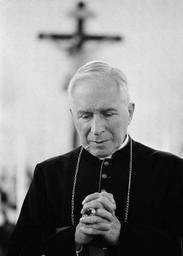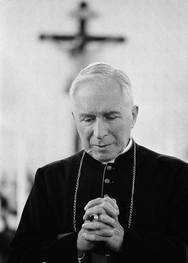
With our poor human imagination, it seems difficult to realize that the one to whom the apostles spoke, whom the Blessed Virgin carried in her womb and in her arms, that this Child Jesus is He by whom all things were made.
Placed before the image of the Infant Jesus in the crib, some might be moved to say, "It is not possible, He could not possibly have created the earth; he was just born." To these St. Paul gives the reply: He was just born, yes, but His Person is a divine Person, and this Person is God, the Word of God. It is truly the Word of God who is there present in the crib, who assumes this body and soul. It is the Word of God, it is this divine Person whom we address. When you speak to someone, you address the person. This Person was the Word of God, by whom all was created. How can anyone then say that this Person who is the Word of God made Man is not Saviour, and Priest and King, the three great attributes that this Person gives to this creature of God by the grace of the hypostatic union? 9
Has any man then the right to be indifferent to the presence of the Word of God in our midst? It is inconceivable. God has willed to come among us; who then has a right to say, "Just let me live my life: I don't need Jesus Christ to live." It is unthinkable, especially since He came to save us from our sins. Consequently, we are all affected because we are all sinners. He came to die on the cross to redeem us from eternal damnation; can anyone then be disinterested? And how can they dare to compare this Person who is our Lord Jesus Christ to Mohammed or Buddha or Luther?... How can a Catholic who has the Faith utter such words? How can they even speak of "the religions, all the religions, the cults" as if they were equal?
Pope Pius VII manifested his indignation when presented with the Constitution of France in which was affirmed the freedom of all the religions. He reacted against the words "all the religions." By these words they were putting the holy religion of God, of our Lord Jesus Christ, on the same level as the heresies and schisms. He was outraged, and he wrote to the Archbishop of Troyes: "Go and see the king. Tell him that it is inadmissible for a Catholic monarch, for a king who calls himself Catholic, to allow the freedom 'of all the religions,' without distinction." The Pope was indignant. This should be the conviction of every Catholic.
It is not possible to be a Catholic and not feel outrage when they speak of "all the religions," placing thereby our Lord on a par with Buddha and all the rest. They do not believe that our Lord is God. They do not believe that it is the Person of God who is before us. Clearly not. Are there several incarnations of God? In Buddha? In Mohammed? In Luther? No, there is only one, in our Lord Jesus Christ. This fact has enormous consequences, and we should sense this in proportion to our belief in the divinity of our Lord Jesus Christ.
What St. John says on this point is very important, as we have seen. It can be summed up in this way: He who affirms that Jesus Christ is God is of God, and he who denies that our Lord Jesus Christ is God is an antichrist (cf. I Jn. 2:22). Antichrist! and, consequently, a devil. St. John, for one, had the Faith, and he knew how to draw the consequences.
9 The union of two natures, divine and human, of Jesus Christ in one unique person, the Person of the divine Word. From the fact that this man Jesus Christ, is God, he is necessarily Savior, Priest, and King.
Extracts from The Mystery of Jesus, by Archbishop Lefebvre, Angelus Press 2000





